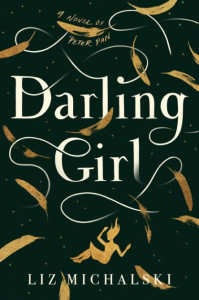
Subtitled A Novel of Peter Pan, this dark tale is not a retelling of the J. M. Barrie classic, but rather a story inspired by it. Holly Darling, granddaughter of Wendy, has come through great trauma to finally arrive at a good place. She lost her beloved husband and one of her twin sons in a terrible car accident, leaving her with a limp and her other son Jack with terrible wounds. Her daughter Eden, born after the accident, has been in a coma for years after a fall from a tree.
That’s a lot of tragedy for one woman. On the plus side, she has wealth through her mother Jane, and Holly herself has started a skincare business that has taken off. Jack has made a miraculous recovery, and Holly is able to use her lab at the business to continue researching a cure for Eden.
Then Eden disappears. Holly is convinced that the only one who could have taken her is Peter.
The family doesn’t talk about the whole Peter Pan thing. Wendy is a beloved memory; the emotionally distant Jane is fascinated by Peter, but also resents the fact that he never took her to Neverland. Yes, there is magic in this story, simply there, something that is part of the Darling family’s world. For Holly, “Maybe the line between the real world and the magical one isn’t quite as solid as she thinks.”
One of the things that brings this book into today’s world is its depiction of the terrible cost of celebrity. With the enduring popularity of Barrie’s book, the Darling family is hounded by stalkers and wannabes, while being fearful of ending up in the news for any reason. By lending her name to her company, Holly has taken a big risk, emotionally.
I took a risk as well, reading this book. Peter Pan is one of my favorite stories, ever since seeing Mary Martin fly across the stage of the Lyric Theatre. Was it really Mary Martin? I’m not sure, but that’s how I remember it. That experience launched me into wanting to become an actress.
It took 15 years for me to learn that acting wasn’t for me; childhood’s dreams don’t always work for adults. Meanwhile Peter’s story became a shifting metaphor for so many things in my life: the yearning for adventure, even dangerous adventures; the idea that wonderful things can come into your life, unexpected and unearned; the recognition that certain people never grow up and others are obsessed with crowing about themselves. I’m often reminded of Wendy’s line after she sews on his shadow: “Of course, I did nothing!”
Michalski’s story is so dark that at times I thought I must be crazy to risk this radically different interpretation of Peter, Tinkerbell, Hook, et al. But I have always been aware of the darkness in Barrie’s story: a charismatic leader who creates a cult-like following eager to agree with him; a father who is also a cruel pirate who flirts with Wendy; Wendy herself as the only one who is eager to grow up, pretending to be a mother to Peter and the lost boys, like women everywhere who take up the slack when men absent themselves.
The problems in Barrie’s tale have been brought home to me more recently in sharing the story with my grandchildren through Cathy Rigby’s film. It has prompted discussions of indigenous people and pirates, gender roles and personal space, lost children and parents, crocodiles and alarm clocks. We act out the parts we love: making Wendy houses, playing Hook and croc chase games, pretending to fly.
It’s as a parent that I appreciate the truth in the themes Michalski draws from the original story to explore here. Teenaged Jack is trying to pull away from Holly’s control, not understanding her reasons for putting limitations on him. Both Wendy and Jane have kept up the fiction that Peter Pan and Neverland are fun and innocent and lovely, leaving Holly vulnerable to Peter’s pixie dust. Not hearing the truth from her mother and grandmother, Holly is a “motherless daughter” as Adrienne Rich described in her essay “Jane Eyre: The Temptations of a Motherless Woman.”
The themes from Barrie’s original story around loss of innocence, aging, and leaving home/parents play out differently here. Our heroes aren’t always who we expect them to be. A couple of Michalski’s darker interpretations are ones that I’ve considered for years.
These days I think more about Wendy’s mother in the original story, losing her daughter to a charming man, a man without a shadow. I wonder about mother and daughter’s relationship after Wendy returns from Neverland, still charmed and eager to return to help with Peter’s spring cleaning. As a parent, I accept the lesson Holly struggles with: “I learned long ago that if you wish to keep your loved ones close, you need to let them leave.” At the same time, I would do anything—really, anything—for my children. Michalski’s story asks how much we will give of ourselves to protect those we love.
Poet Stevie Smith said, “we must put away the beautiful fairy stories / And learn to be good in a dull way without enchantment.” Michalski’s book is anything but dull; I couldn’t stop reading. It is a book for adults, for those of us who have learned to be wary of enchantment and to treasure the truth.
What modern interpretation of a fairy tale have you read?
